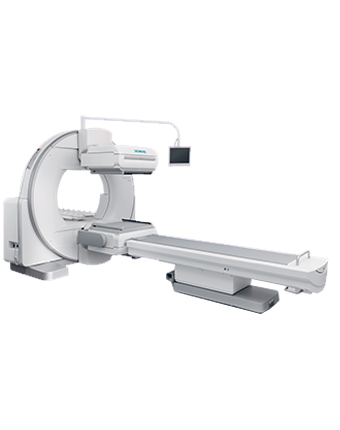Gamma Camera
Reserve now
Service Description
A gamma camera, also called a scintillation camera, is a device used to image gamma radiation emitting radioisotopes, a technique known as scintigraphy
Preparations
- Women should always inform their physician or technologist if there is any possibility that they are pregnant or if they are breastfeeding.
- You should inform your physician and the technologist performing your exam of any medications you are taking, including vitamins and herbal supplements. You should also inform them if you have any allergies and about recent illnesses or other medical conditions.
- Jewelry and other metallic accessories should be left at home if possible, or removed prior to the exam because they may interfere with the procedure.
- In some instances, certain medications or procedures may interfere with the examination ordered
- You should avoid caffeine (caffeinated as well as decaffeinated coffee, hot and cold tea, caffeinated soft drinks and energy drinks, etc.) and smoking for up to 48 hours before your examination.
- Hepatobiliary Nuclear Medicine
- You should not eat or drink for at least four hours before your exam.
- You should not have tests that use barium for 48 hours before hepatobiliary imaging.
- Renal Scintigraphy
- Preparation can vary widely based on the type of scan being conducted.
- You may be asked to drink extra fluid or possibly receive intravenous (IV) fluids.
- You may also be given a diuretic to increase urine production. In some cases, the bladder may need to remain empty during the scan, necessitating the Insertion of a catheter. In other cases, you may be asked to go to the bathroom and empty your bladder prior to imaging.
- You also may be asked to discontinue use of some medications prior to your exam
- Tell your physician if you are taking non-steroidal anti-inflammatories (NSAIDs) .
Timing
Average scan time from 1 to 3 hours
Service consultants
Service devices


